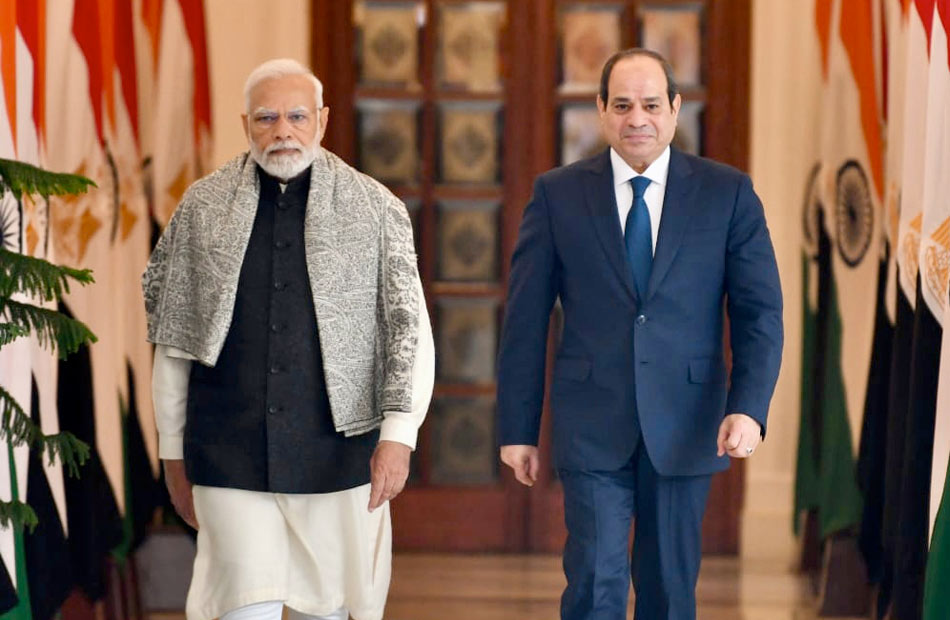India’s interest in Middle East region, especially the gulf states, has been growing since the election of Narendra Modi, and his government has sought to strengthen economic and military cooperation with countries in the region. India relies on the Middle East for supplies of energy, while countries in the region are now looking to Asia in their quest to diversify their military and economic partnerships. This has been reflected in the exchanges of high level visits between leaders from India and Arab countries, the latest of which was that by Egyptian President A Abdel Fattah El-Sisi, to New Delhi on the 25th of January. In his third visit to India, President El-Sisi was the principal guest to India’s Republican Day celebrations. The visit also sought to strengthen bilateral relations, regarding trade economic cooperation, as well as enhanced security cooperation between Egypt and India.
Areas of cooperation
While India has an interest in securing the continued flow of oil from the region, to support its economic growth and rise to global power status, it is also interested in widening the scope of cooperation to new areas. Examples of the current areas of cooperation between India and regional countries include:
Exploring outer space. India is seeking to become amajor player in space, and it is seeking to shore up cooperation in this area with other countries, such as the UAE. During the Abu Dhabi Space Dialogue, held December 5-6, 2022, Professor Jitendra Singh, IndianMinister of State for Space and Science and Technology,declared in the opening session the Abu Dhabi Space Dialogue to be a major global event, and a platform from which solutions to address challenges related toexploring space will emerge. The minister also describedthe UAE as an important contributor to this sector, with its ambitious projects, such as the mission to explore Mars, and the Astronaut Program.
Renewable energy. With the rise of India as a world leader in the field of renewable energy- the 4th in the production of wind energy, and the 5th in the production of solar energy- cooperation in this field has become one of the pillars of the Indian-Arab partnership.
The Indian Minister of Commerce and Industry Piyush Goyal visited Saudi Arabia, on September 19, 2022, to participate in the meeting of the Economic and Investment Committee of the Saudi Indian Strategic Partnership Council, which includes several working groups on energy, agriculture, food security, information technology, as well as a joint industrial group.
A memorandum of understanding for cooperation in the field of renewable energy between the two countries has recently been signed, as well as two memorandums of cooperation between the King Abdullah Petroleum Studies and Research Center (KAPSARC) and Indian research centers. This resulted in 3 joint seminars, two workshops, and the production of 24 papers in joint activities.
Combatting terrorism. Indian interest in Arab efforts to confront terrorism has been growing of late, as it perceives that radical and extremist ideologies could spread to India. India has sought to enhance its security cooperation with regional countries, including Egypt. During the latest visit of Egyptian President Abdel Fattah El-Sisi to New Delhi, India and Egypt agreed to enhance joint cooperation in the security field to confront terrorism and violence, based on the mutually heldconviction that there can be no development without security and stability. On January 8th, the Indian authorities announced the arrest of two members of an ISIS cell linked to figures in Syria.
Syria reconstruction. India has maintained diplomaticrelations with the Bashar Assad Regime in Syria, as well as some joint economic projects. India has also expressed interest in undertaking reconstruction projects in Syria.During a visit to India by the Syrian Foreign Minister last November, the vice president of India Jagdeep Dhankharexpressed his country’s willingness to cooperate with Syria in the areas of renewable energy, fertilizers, civil aviation, and vocational training.
Moreover, in order to address the deterioratinghumanitarian situation in Syria, where the number of people in need of humanitarian assistance has grown from 14.6 million last year to an estimated 15.3 millionin 2023, India’s permanent representative to the UN Ruchira Kamboj, announced last December that India will provide credit facilities to Syria of 280 million dollars. These are to be dedicated to construction of anenergy plant and a steel plant. India also has provided shipments of food and medication to help with the crisis of rising food prices, and the fallout from COVID-19.
Humanitarian aid to the Palestinians. The Indian government donated during 2022 an amount of 2.5 million dollars to UNRWA, to support the health, education, and social services it provides to Palestinian refugees. India has donated a total of 20 million dollars to support UNRWA services in the Middle East since 2018. It is worth noting that India, upon assuming the role of presiding over the UN Security Council lastDecember, expressed its support for direct negotiations between the Palestinian Authority and Israel on all issues, as the best means of reaching a two state solution.
Supporting Algeria in international forums. The Indian ambassador to Algeria Gaurav Ahluwaliaannounced on the 16th of January that, in return forAlgeria’s support to India in gaining a non-permanent seat on the UN Security Council , India will support Algeria’s bid to gain a seat. He also declared India’s support for Algeria’s bid to join BRICS, formally submitted last November.
As competition for influence and economic partnerships heats up in the Middle East, and especially with increased Chinese attention to the region, India is likely to ramp up efforts to establish its own position. Prime Minister Modi’s government is likely to undertake an active round of diplomacy in the region, ensuring its energy imports – asthe third largest user of energy after the US and China– are safeguarded. Therefore preventing conflicts from erupting in the region, as well as confronting and undermining extremist movements and terrorist organizations, have become central strategic interests for India.


